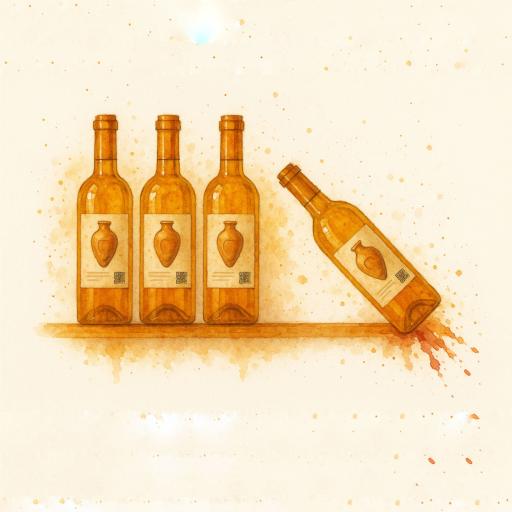The prevalence of counterfeit goods in the world is shockingly high. Counterfeits are by definition a little hard to track precisely, but estimates suggest that more than 3% of globally traded goods are fake, and that the problem is growing fast. By 2030, 1 out of every 20 dollars may be spent on counterfeit goods. And of course, the pain isn’t spread evenly across all industries: the most commonly faked items are luxury goods. We’ve all had the dubious opportunity to buy a flimsy rolex or a suspicious “designer” bag, but a less obvious industry that is hard-hit by the counterfeit market is wine. Connoisseurs and curious palates will pay a pretty penny for a special bottle, but apart from a few words and a sexy image on the wine label – what makes you think the wine you are buying is the one you think you are buying?
Now imagine your consternation about potentially buying a fake, and put yourself in the shoes of a winemaker… Generations of tradition, decades of tending precious vines and terroir, years of gently aging a unique product in special barrels. Only to have some schmuck in a back alley slap a copy of your label on a totally different bottle. It’s a huge yikes for everybody, but for the most special of family-run wineries, it’s a matter of reputation and ultimate survival.
You may have heard that blockchain can be a useful player in the future of supply chain management, but what does that really mean, and is anyone actually doing it?
A QR Code with a big idea
Scantrust is a Swiss-based company with a simple mission: make it easier to trust what’s in your hand. Their product is a QR code, which might sound a bit… simple? However, their patented QR codes aren’t your everyday black-and-white squares that you can conjure up on any qr code generator. These stickers are fortified with a tamper-resistant graphic fingerprint that CANNOT be photocopied or digitally replicated. I had the pleasure of watching a demo of this product at the 2024 Cardano Summit in Dubai, where they explained that even the most sophisticated photocopy technologies introduce minor changes and tiny artifacts to any reproduction, and Scantrust’s patented tech can smell a fake from a mile away.
When brands use Scantrust QR codes on physical goods, consumers and inspectors alike can scan them to verify that a product is what it claims to be.
But a fancy QR code alone isn’t the full story. What about the data behind that code? Where did it come from? Who entered it? Where is it stored? And what’s stopping someone from going in and quietly tweaking that information later?
That’s where Scantrust hit a wall. For their vision to work at global scale, they needed a public, immutable ledger—one that would store the product’s history in a way that no one, not even Scantrust themselves, could alter behind the scenes.
The Cardano Connection
In 2020, Scantrust and the Cardano Foundation began collaborating to build a real-world proof of concept. Together, they developed a connector that allows Scantrust’s secure QR codes to interface directly with the Cardano blockchain. With it, a product’s origin, ownership, and journey could be recorded immutably and verified publicly—turning a brand’s story from marketing fluff into cold, verifiable facts.
But they didn’t want to demo the technology on handbags or sneakers. They wanted a product with heart, heritage, and risk. Something that would actually benefit from this kind of transparency. They found their case study in the rolling vineyards of Georgia.
Why Georgian Wine?
The country of Georgia in eastern europe is thought to be the “cradle of wine.” This is not just a tourism slogan (although – sign me up). Archaeological digs have turned up ancient qvevris (buried clay fermentation vessels) and grape seeds that go back 8,000 years, predating any other known European vintner. Today, Georgian wine is still special. Georgia is home to more than 500 unique grape varietals, most of which cannot be found anywhere else. And many Georgian wineries still make their wine in clay qvevris, a tradition that really isn’t practiced anywhere else.
But Georgian wine has a modern problem. While its product is world-class, you’ve never heard of it. Neither has most of the world market. Labels alone struggle to communicate quality or provenance. Worse, fake Georgian wines have started to pop up in international markets, harming both reputations and revenues. For small producers, this is more than frustrating—it’s existential.
Meet Baia’s Wine
To pilot the blockchain traceability solution, Scantrust and Cardano partnered with Baia’s Wine, a family-run vineyard in the Imereti region of western Georgia. Led by sisters Baia and Gvanca Abuladze, the winery specializes in traditional winemaking techniques, producing organic wines from indigenous Georgian grape varieties.
Every bottle they sell represents not just a product, but a story—a real one, rooted in soil, culture, and family legacy.
The partnership allowed Baia’s team to attach a Scantrust QR label to each bottle. When scanned, the code opens a custom landing page showing the full lifecycle of the wine: where and when the grapes were harvested, how they were fermented, when the wine was bottled, where it was shipped, and even personal notes and photos from the winemakers themselves.
It’s like a digital passport for your bottle of wine—and the data is secured by Cardano’s public blockchain.
Problem Solved!
So, we’ve got a beautiful unique product, a patented QR code, and an immutable public ledger to provide trust. Any questions?
Yeah, I still think the counterfeiter could just stick on their own QR code.
You’d think so. But Scantrust’s technology is specifically designed to make that hard. Each QR code contains a secure visual pattern that’s impossible to replicate accurately. If someone copies the code and pastes it on a fake bottle, the system detects that the code has already been used—or worse, that the scan is suspicious. It’s like trying to forge a fingerprint.
Still, there’s a reasonable concern: if Scantrust owns the patent for this tech, doesn’t that put a lot of trust in a single company? Which brings us to…
Doesn’t relying on Scantrust make it kind of Centralized?
Yes and no. Scantrust’s label generation is centralized, but the data attached to each code—the record of a bottle’s history—is stored on Cardano, a public blockchain. This means that once data is written, it can’t be altered by Scantrust, the winery, or anyone else. Even better: it’s verifiable by anyone, using open tools. You don’t need to trust Scantrust’s servers to believe the story; you can confirm it on-chain. In other words, Scantrust ensures physical authenticity, while Cardano ensures data integrity.
Why Blockchain? Why Not Just a Web App?
You could build a web app that tracks a product’s journey. But what happens when someone tampers with the database? Or when the company goes under and takes the server with it?
A blockchain like Cardano offers permanent, decentralized storage. Anyone can audit the data. Even if Scantrust shut down tomorrow, or Baia’s website vanished, the blockchain record of the wine’s journey would remain accessible and verifiable.
This adds a unique layer of confidence for consumers—and it levels the playing field for small producers who can’t afford expensive, centralized tech solutions and long-term data storage.
So Why Isn’t Everyone Doing This?
That’s the million-dollar question. The answer boils down to:
- Cost and complexity – Even with Cardano’s low fees, onboarding blockchain and QR verification systems requires time, money, and training.
- Patent restrictions – Scantrust’s tech isn’t open-source. For this to scale globally, the company needs to either price it affordably or allow others to develop compatible solutions.
- Consumer awareness – Most buyers still don’t scan QR codes unless prompted. Wineries and retailers need to educate the public on why it matters.
In short, the tech is ready—but adoption depends on business models, affordability, and user habits.
What’s Next?
The pilot with Baia’s Wine was a hit. Customers loved the transparency. Buyers in the UK, Canada, and South Korea opened up new markets for Georgian wine. And after a successful run, the Georgian National Wine Agency scaled the program to over 30 wineries across the country under the Georgian Wine Traceability Program. Together, Scantrust and Cardano are helping an ancient industry step into the digital age—without losing its soul.
Here’s what I’m hoping for next – for this program to continue growing and spreading! After I learned about it, I really wanted to do two things:
- Try some Georgian wine! I’d never heard of Georgian wine at all, nor of the ancient traditions of the qvevri. I am real-world case study #1 of how a little educational marketing leads to a thirsty new customer!
- Scan a scantrust QR code on something – hopefully a bottle of wine.
I was able to achieve goal #1. Not every small liquor store will sell Georgian wine – it’s not a huge global supplier, it’s special! But a good specialty shop will have a few spots on the shelf for Georgian wine. I tried some – or at least I think I did! Because in my local shops, none of the wineries currently partnering with Scantrust were represented.
Did I really get to try Georgian wine or was I taken in by a counterfeit?? This consumer now knows to be skeptical, curious, and to hope that verifiable goods become a more common market demand!
Beyond the Bottle: Where Else Could This Work?
The QR + blockchain combo has clear applications in other high-value or high-risk sectors: luxury goods, pharmaceuticals, specialty foods, cosmetics, even aircraft parts. Anywhere provenance matters—and fraud hurts—this kind of verifiable digital identity can add value and protect trust.
Final Pour
Supply chain buzzwords like “traceability” and “provenance” can sound dry. But when you’re holding a bottle that was grown, harvested, fermented, and shipped by a family halfway across the world, those words come to life.
Thanks to a unique partnership between a secure QR company and a public blockchain, you could now scan a bottle and meet the people behind it. You can verify the story. You can trust what’s in your glass.
In a world full of fakes, that’s worth raising a toast to. As they would say in Georgia: “Gagimarjos!”



No comments yet…